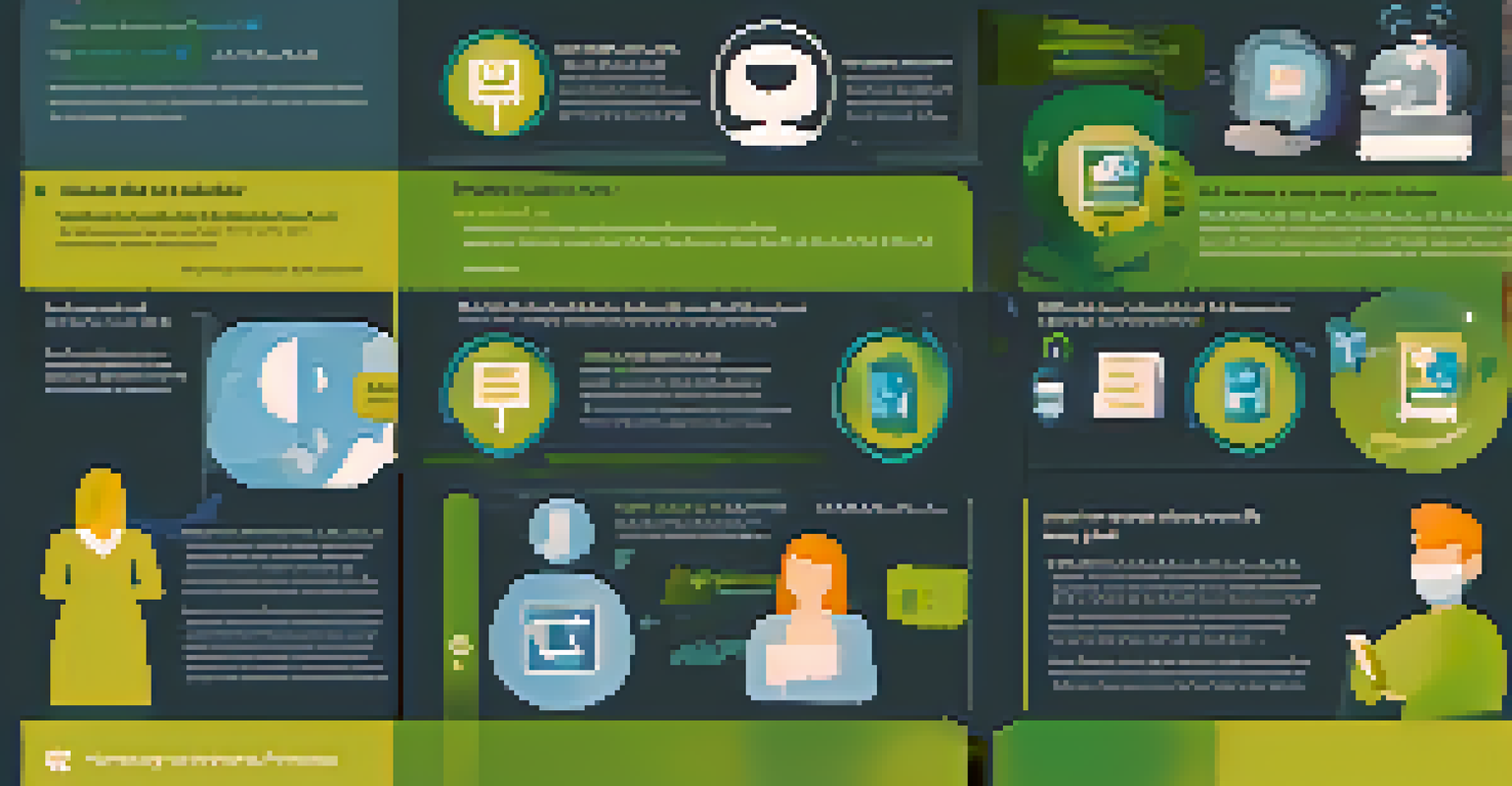The Impact of Social Media on Patient Privacy and Ethics

Understanding Patient Privacy in the Digital Age
Patient privacy refers to the right of individuals to keep their health information confidential. In today’s digital age, this concept faces challenges, especially with the rise of social media platforms where personal stories are often shared. For instance, a patient might unknowingly disclose sensitive information when posting about their health journey.
The greatest danger in times of turbulence is not the turbulence; it is to act with yesterday's logic.
With the click of a button, private health details can become public, raising concerns about who has access to this information. This can lead to breaches of confidentiality, making it crucial for both patients and healthcare providers to understand the implications of sharing information online. The balance between sharing experiences and protecting privacy is more important than ever.
Moreover, it’s not just the patients who need to be cautious; healthcare professionals must also navigate the tricky waters of social media. They have ethical obligations to maintain patient confidentiality, and posts that seem innocent can have serious repercussions. It's essential to foster an environment where both parties are aware of these boundaries.
The Role of Social Media in Patient Engagement
Social media can act as a double-edged sword when it comes to patient engagement. On one hand, platforms like Facebook and Twitter provide an opportunity for patients to connect with others who share similar experiences, fostering a sense of community. For example, support groups on these platforms can help individuals feel less isolated during their health journeys.

Conversely, this engagement can blur the lines of privacy. When patients share their stories online, they may unintentionally expose sensitive information that could be exploited. This makes it vital for users to think critically about what they share and to understand the potential consequences of their online presence.
Patient Privacy is Crucial Online
In the digital age, patients and healthcare providers must navigate the challenges of sharing health information on social media while maintaining confidentiality.
Healthcare providers can also leverage social media to engage with patients, share information, and promote health literacy. However, they must do so ethically, ensuring that they respect patient privacy and confidentiality. Striking the right balance between engagement and protection is key.
Ethical Dilemmas Faced by Healthcare Professionals
Healthcare professionals often grapple with ethical dilemmas when it comes to social media usage. One primary concern is the potential for breaching patient confidentiality, which can result in severe consequences for both the provider and the patient. For instance, sharing a success story that identifies a patient can lead to unintentional exposure of their health history.
In an age of information, ignorance is a choice.
Another dilemma is the fine line between professional and personal use of social media. Providers must be cautious about how they present themselves online, as anything they post could reflect on their professional reputation. This duality can create pressure to maintain a perfect online persona, which is both challenging and potentially deceptive.
To navigate these dilemmas, many healthcare organizations provide guidelines on social media usage. These resources help professionals understand the ethical boundaries and the importance of maintaining patient trust while using these platforms. Awareness and training are essential in fostering a culture of ethical practice in the age of social media.
Legal Implications of Social Media Use in Healthcare
The legal landscape surrounding social media in healthcare is complex and ever-evolving. Laws like HIPAA (Health Insurance Portability and Accountability Act) set strict standards for patient privacy, making it illegal to disclose any identifiable health information without consent. Violations can lead to hefty fines and legal repercussions for healthcare providers.
As social media blurs the lines between public and private, understanding these legal implications becomes crucial. For example, a provider who comments on a patient’s post without permission could face legal action. This emphasizes the need for training and awareness about the legal responsibilities that accompany social media use.
Social Media's Double-Edged Sword
While social media fosters patient engagement and community, it can also lead to unintentional exposure of sensitive health information.
Additionally, patients should be educated about their rights regarding privacy and the potential legal consequences of sharing their information. By fostering this understanding, both patients and providers can work together to navigate the complex intersection of social media, privacy, and legality.
The Impact of Patient Stories on Public Perception
Patient stories shared on social media can significantly influence public perception of health issues. These narratives often humanize medical conditions, helping others understand the experiences of those affected. For instance, a cancer survivor sharing their journey can raise awareness and inspire others facing similar challenges.
However, while sharing personal stories can be empowering, it can also lead to oversimplification of complex health issues. Not all experiences are the same, and social media can sometimes paint a misleading picture. It's essential for readers to approach these stories critically, recognizing that individual experiences may not represent the broader reality.
Healthcare providers have a role in guiding this narrative by promoting accurate information and encouraging patients to share their experiences responsibly. By doing so, they can help shape a more informed public perception while respecting individual privacy.
Strategies for Protecting Patient Privacy Online
To safeguard patient privacy in the age of social media, both patients and healthcare providers must adopt proactive strategies. For patients, being mindful of what they share online is crucial. This includes avoiding the disclosure of identifiable information and being cautious when joining support groups or forums.
Healthcare providers can implement strict social media policies and provide training on best practices. This ensures that all staff members understand the importance of maintaining confidentiality and the potential risks associated with social media use. Regular workshops can help keep everyone informed about evolving technologies and privacy standards.
Ethics and Legal Risks in Healthcare
Healthcare professionals face ethical dilemmas and legal implications when using social media, making guidelines and training essential for protecting patient privacy.
Additionally, fostering open communication between patients and providers can enhance trust. Encouraging patients to discuss their concerns about privacy can lead to more informed decisions about what they share online. Together, they can create a culture of privacy that respects individual rights while embracing the benefits of social media.
Future Trends in Social Media and Patient Privacy
As technology evolves, so do the trends in social media and patient privacy. Emerging platforms and tools are constantly reshaping how individuals interact and share information, which can have profound implications for healthcare. For example, the rise of telehealth and online consultations is changing how patients communicate with providers.
With these changes come new challenges regarding privacy and ethics. The use of artificial intelligence in healthcare can lead to more personalized experiences, but it also raises concerns about data security and consent. Keeping up with these trends will be essential for both patients and providers to navigate the complexities of privacy in the digital world.

Looking ahead, it will be vital to establish clear guidelines and best practices that prioritize patient privacy while harnessing the benefits of social media. By fostering a culture of awareness and responsibility, the healthcare community can adapt to these changes while ensuring that patient confidentiality remains a top priority.